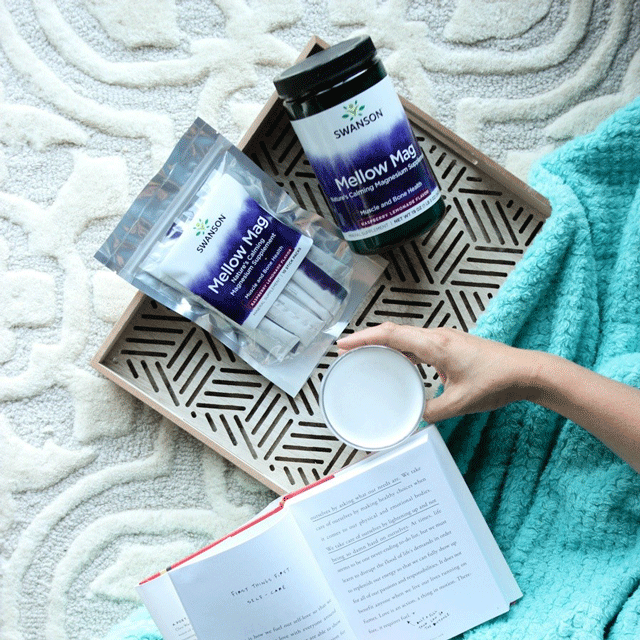What is the Best Magnesium Supplement Form for You?
By Lindsey Toth, MS, RD

Researchers estimate that 2/3 of the people in developed countries, and at least half of all Americans, don’t meet their daily needs for magnesium.1,2 That may largely be due to our diets, but our soil is also suffering from magnesium depletion, which leads to magnesium deficiencies in plants, including food crops that were previously our richest dietary sources of magnesium.2
Why does your magnesium intake matter? Magnesium is an essential mineral that our bodies need for hundreds of biochemical reactions, and low magnesium intake has been linked to a broad range of health concerns.1 It’s essential for bone development and maintenance, muscle and nerve function, cardiovascular health and much more.3 Magnesium is also a great way to support relaxation and help defend against stress.
If you don’t get enough magnesium in your diet, you may think the answer is simple—just take a supplement, right? But there are many types of magnesium supplements, and the body absorbs each differently. So, which magnesium supplement should you take? What is the best form of magnesium for you? Let’s take a closer look at the most common magnesium supplement types available.
Magnesium Citrate
Magnesium citrate is a magnesium citric-acid complex that is widely available and versatile. It has better bioavailability than magnesium oxide, and this popular magnesium supplement is widely recommended by doctors and health professionals.4
100% Pure Magnesium Citrate Powder into your favorite drink. It’s a great option for the budget-conscious!
Magnesium Oxide and Hydroxide
Magnesium oxide and magnesium hydroxide are similar in structure and function and are both common ingredients in over the counter digestive tonics. Both magnesium hydroxide and magnesium oxide can have a mild laxative effect.5
These forms of magnesium generally cost less than other types of magnesium but have lower bioavailability.6 As a result, magnesium oxide and magnesium hydroxide supplements may contain as much as 60% more magnesium than other types of magnesium supplements to help make up for the lower bioavailability.6
As a general rule, loose stools from magnesium supplementation are a sign that your body isn’t fully absorbing the magnesium or that you’re taking too much magnesium at once. If you want to avoid potential laxative effects of magnesium, it may help to divide your intake into 2 or more smaller doses taken at different times of the day.
Magnesium Chelates
Chelated mineral supplements, including magnesium chelates, are minerals that are bound to amino acid proteins to help make them easier for your body to absorb.7 There are many different types of magnesium chelates featuring various amino acids that provide additional benefits.
Magnesium amino acid chelates include:
- Magnesium Glycinate – Magnesium bound with glycine, provides optimum bioavailability8
- Magnesium Lysinate – Magnesium bound with lysine, helps pamper skin with amino acids9
- Magnesium Orotate – Magnesium bound with orotic acid, supports heart health10
- Magnesium Taurate – Magnesium bound with taurine, supports heart health while promoting calmness11
- Magnesium Aspartate – Magnesium bound with aspartic acid, helps fight fatigue and promotes cellular energy12
- Magnesium L-Threonate – Magnesium bound with threonic acid, promotes mental sharpness and cognitive health12
- Magnesium Malate – Magnesium bound with malic acid, supports energy production12
Chelated magnesium supplements may cost a little more because of the complex processes required to make them. However, since the body is very good at absorbing amino acids, magnesium chelates have higher bioavailability, making magnesium chelates a great option for boosting your body’s magnesium levels.
The Best Type of Magnesium for You
There are many types and forms of magnesium supplements, and they differ both in their benefits and bioavailability. Some supplements, like magnesium chelates, have additional benefits due to the amino acids that accompany them. The best magnesium supplement for you will depend on the benefits you seek. If you want to replenish magnesium levels while giving your heart health some extra support, try magnesium taurate or magnesium orotate. If you are looking for optimal bioavailability, a magnesium chelate like Swanson Ultra Chelated Magnesium is a great choice.
Be sure to also sign up for our Swanson Health newsletters to stay in the know on all of our new articles and promotions.

About Lindsey Toth, MS, RD
Registered Dietitian, Swanson Health Products
Lindsey is a nationally-recognized registered dietitian and nutritionist with a soft spot for pie. She empowers people to take charge of their health by finding the balance between the pleasure and nourishment in food. Her philosophy is that you should take care of your body because it’s the only permanent home you have. It’s what inspired her to pursue a career in nutrition and, ultimately, led her to Swanson Health.
Sources
1 Magnesium Deficiency: What is our status? Nutrition Today. https://journals.lww.com/nutritiontodayonline/Abstract/2016/05000/Magnesium_Deficiency__What_Is_Our_Status_.4.aspx (Accessed 09/25/2018)
2 Magnesium Deficiency in Plants: An Urgent Problem. ScienceDirect. https://www.sciencedirect.com/science/article/pii/S221451411500121X (Accessed 09/25/2018)
3 Magnesium Fact Sheet for Health Professionals. National Institutes of Health. https://ods.od.nih.gov/factsheets/Magnesium-HealthProfessional (Accessed 09/25/2018)
4 Magnesium bioavailability from magnesium citrate and magnesium oxide. PubMed. https://www.ncbi.nlm.nih.gov/pubmed/2407766 (Accessed 09/25/2018)
5 Magnesium Oxide. Pub Chem. https://pubchem.ncbi.nlm.nih.gov/compound/magnesium_oxide#section=Top (Accessed 09/25/2018)
6 Bioavailability of US commercial magnesium preparations. PubMed. https://www.ncbi.nlm.nih.gov/pubmed/11794633 (Accessed 09/25/2018)
7 Supplements with Amino Acid Chelated Minerals. Consumer Lab. https://www.consumerlab.com/answers/are-supplements-with-amino-acid-chelated-minerals-better-than-those-with-other-forms-of-minerals/amino_acid_mineral_chelates/ (Accessed 09/25/2018)
8 The uses and benefits of magnesium glycinate. Medical News Today. https://www.medicalnewstoday.com/articles/315372.php (Accessed 09/25/2018)
9 Lysine. WebMD. https://www.webmd.com/vitamins/ai/ingredientmono-237/lysine (Accessed 09/25/2018)
10 Magnesium Orotate. Consumer Lab. https://www.consumerlab.com/answers/what-is-the-benefit-of-magnesium-orotate-compared-to-other-forms-of-magnesium/magnesium_orotate/ (Accessed 09/25/2018)
11 Taurine. WebMD. https://www.webmd.com/vitamins/ai/ingredientmono-1024/taurine# (Accessed 09/25/2018)
12 Magnesium Supplements. Dr. Steve Lin. https://www.drstevenlin.com/magnesium-supplements/ (Accessed 09/25/2018)
These statements have not been evaluated by the Food and Drug Administration. These products are not intended to diagnose, treat, cure or prevent any disease.












LEAVE A COMMENT :
Comments sort : Newest / Oldest / Most Upvoted